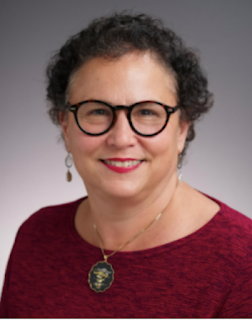From the October 21, 2022 issue of the Transformational Times
Guest Director’s Corner
Bike vs. Auto
By Cassie Ferguson, MD
Dr. Ferguson discusses how empathy can lead to a deeper connection with patients…
Two weeks ago, I got a call that no parent is truly ever prepared to get, even those of us who spend much of our lives “dress rehearsing tragedy” (Brené Brown, Dare to Lead). I was driving home from a shift in the Children’s emergency department (ED) when an unfamiliar number popped up on my phone. I immediately got a sinking feeling in my gut and answered quickly. It was my oldest son, Ben.
“Mom, I got hit by a car but I’m okay. I just kind of hurt my leg.”
Breathless, I paused and tried to find the next right thing to say.
“Where are you, Benny? Who is with you?”
“The police are here. Do you want to talk to them?”
The police?? Suddenly the image I had in my mind of a minor accident was replaced by one that included lights, sirens, and caution tape and I could feel myself getting pulled into the mode I naturally revert to when I’m running a code: gather information quickly, prepare for the worstcase scenario, plan the next steps. I cleared my throat and spoke with the officer who explained what had happened in far more detail than my brain—now fully in flight or fight mode—was ready to hear.
When I think back to that day, it is that retelling of exactly how my son was hit, how he rolled up onto the hood of the car, and how he was thrown back down to the ground, that still undoes me. It is hearing from Ben that he was riding his bike home from school and decided to turn to get a chocolate chip cookie from the neighborhood bakery just before he was hit that brings me to my knees.
That night as my son and I sat in my own ED getting films and waiting to hear about the next steps, I thought about all the mothers whose injured children I’d cared for—children far more seriously injured than Ben. Children whose lives were forever changed by their injuries. Children who had died. I thought of all the exquisitely painful details those mothers had to hear and then live with for the days, weeks, and years that followed. And it struck me how little we do to prepare them for what it will feel like to live with those details. How little we prepare them for the searing anger that will suddenly take hold of you when you see your child wince in pain; for the welling up of sadness when you’re reminded of what your child will miss out on because of their injury; for the intense terror that will grab you when you drive by the scene of the accident.
We have had so many people reach out to us since Ben was hurt, and the love that has surrounded him and our family has been incredible. I’ve observed that in these encounters the two words I hear the most from those intending to comfort and lift up are “at least.” At least he was wearing his helmet. At least he was not more badly injured. At least the driver stopped. At least… And that is all true. I am extraordinarily grateful that Ben is okay, and that his leg will heal. And I say those same words frequently in the ED intending to support my patients’ families after close calls with tragedy. I believe that while it is not necessarily in our nature, our culture prompts us to seek and point out the positive. As caregivers we are taught to be useful and provide hope—as a profession, we value optimism, grit, and resilience and these values are passed onto our patients.
With some reflection, however, I can see that this approach is also a way to create separation between me and the person for whom I am caring; a way to put a safe distance between myself or my children and a similar, imagined tragedy. And yet empathy requires we get up close. It requires that we connect with something inside of ourselves that knows what it feels like to be them. This is not a knowing that comes from our own experiences or imagining what it would feel like to “walk in their shoes.” This is a deeper knowing that arises from vulnerability; from a willingness to be open to our own suffering, and to know our own darkness such that our care arises not from pity but from a shared sense of what it really is to be human.
Up close we can just sit and let our presence be a signal that we are there and that we are paying attention. Up close we can use the sacred gift of touch to heal. Up close we can ask questions like, “What does it feel like to experience this as a mother?” If you asked me that question right now, I would tell you that I feel angry and sad and afraid. I would tell you that during the last two weeks I’ve experienced guilt, overwhelm, and anxiety.
And we might notice, the two of us, that just by asking and answering that question, we can find some kind of relief, some sense of rest in the knowledge that we are not alone.
Cassie Ferguson, MD, is an Associate Professor of Pediatrics (Emergency Medicine) at MCW and the Associate Director of the Robert D. and Patricia E. Kern Institute for the Transformation of Medical Education.



